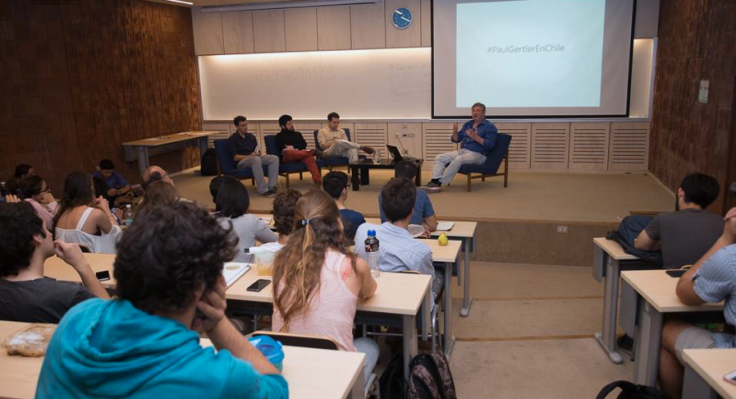Preventing non-communicable diseases with evidence-based policy: UC Berkeley Professor Paul Gertler visits J-PAL LAC

According to the WHO, deaths associated with non-communicable diseases, or NCDs, have increased worldwide in the past two decades, with higher growth rates in developing countries. NCDs like heart disease, cancer, and diabetes are responsible for almost 70 percent of the world’s deaths, even though many of these diseases are preventable.
Chile, where J-PAL’s Latin America and the Caribbean (LAC) office is based, has high rates of risk factors associated with NCDs, including unhealthy diet, physical inactivity, and tobacco use. Prevention and early treatment of these diseases has become a major concern for the Chilean government.
In November, J-PAL affiliate Paul Gertler (UC Berkeley) visited our J-PAL office in Santiago to advance research focusing on the prevention of non-communicable diseases.
Paul—a renowned academic who pioneered the use of randomized evaluations of social programs in developing countries—has conducted research in Latin America since 1997, beginning with a landmark evaluation of Mexico's conditional cash transfers program, Progresa. Some of his latest research focuses on health interventions and, in particular, on the prevention of NCDs.
During his visit, J-PAL LAC and the Department of NCDs of Chile’s Ministry of Health hosted a roundtable discussion to set a research agenda for identifying effective programs to prevent and treat NCDs.
Paul presented an evidence review of health programs targeting prevention of chronic diseases by modifying human behavior (see full presentation here). Participants, including representatives of insurance firms, government officials, and academics in the fields of nutrition and public health, discussed how educational programs and behavioral nudges can promote healthier decision-making.
Encouragingly, the roundtable resulted in follow-up meetings with both insurance companies and government agencies interested in evaluating the impacts of their programs. Understanding these impacts is an important first step in reducing NCD mortality in Chile and elsewhere. We hope these discussions will generate new evaluations to build the global evidence base on strategies for preventing and combatting NCDs.
Beyond NCDs
Paul also gave a talk at J-PAL LAC’s host university, the Pontificia Universidad Católica de Chile, on the topic of collaborating with governments to improve public policy. He shared his research and teaching experiences—and elicited more than a few laughs—with more than 120 students across a range of disciplines, from sociology to engineering. Learn more about Paul’s research projects in the region.

Finally, Paul wrapped up his visit with remarks at the launch of our new J-PAL LAC course alumni network. The network aims to bring together people in Santiago who have participated in J-PAL LAC training courses, including those who have completed our new free Spanish-language online course on Evaluating Social Programs.
Learn more about our course alumni network and watch a video on J-PAL's Facebook page of Paul’s presentation to alumni here.